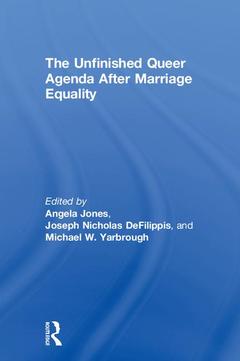The Unfinished Queer Agenda After Marriage Equality After Marriage Equality Series
Coordonnateurs : Jones Angela, DeFilippis Joseph, Yarbrough Michael

While legal recognition of marriage has met the needs of a segment of the LGBTQ population, many still face daily struggles with issues around housing, education, healthcare, policing and incarceration, and immigration. These are issues that were largely eclipsed in national arenas by the fight for marriage equality.In reaction to this, The Unfinished Queer Agenda After Marriage Equality examines the institutional failings and overlapping systems of injustice that continue to dehumanize queer and trans people and deprive them of basic human rights.
Building on a major conference held in 2016 entitled "After Marriage: The Future of LGBTQ Politics and Scholarship", the editors have collected academic papers, edited transcripts of selected conference sessions, and interviews with activists. Drawing from this source material, the book argues that any queer agenda should be informed by an understanding that the issues facing queer and trans people come from the combined influence of neo-liberal capitalism, global white supremacy, and heterosexism. The authors argue that these modes of oppression continue to be especially damaging for poor people, undocumented people, people of color, non-binary, trans, and queer people.
By taking an in-depth look at the myriad social issues that continue to affect LGBTQ communities, and by exposing systemic prejudices and inequality as the root cause, this title is an important intervention for students and researchers engaged with queer and trans activism, beyond the fight for marriage equality.
Preface, Introduction, Chapter 1: What is "the Queer Agenda? Chapter 2: Anti-Blackness and "the Queer Agenda": Post-Conference Reflections with Hari Ziyad Chapter 3: Systemic Violence: Reflections on the Pulse Nightclub Massacre Chapter 4: Queering the Trade: Intersections of the Sex Worker and LGBTQ Movements Chapter 5: The Tacit Targeting of Trans Immigrants as "Criminal Aliens": Old Tactics and New Chapter 6: Passing As Experts in Transgender Medicine Chapter 7: Who are the Stewards of the AIDS Archive?: Sharing the Political Weight of the Intimate Chapter 8: LGBTQ Youth and Education: Rethinking Children’s Rights in Schools Chapter 9: "I Want to Be Happy in Life": Success, Failure, and Addressing LGBTQ Youth Homelessness Chapter 10: The Anti-Man Aesthetic: The State of LGBTQ Political and Social Issues in Guyana Post Marriage Equality in the United States Chapter 11: Queer Latinx American Bodies in Transnational Contexts: Case Studies from Brazil, Chile, and Peru Chapter 12: Deadly Denial: Queer Poverty
Angela Jones is Associate Professor of Sociology at Farmingdale State College, SUNY, USA. Her research interests include African American political thought and protest, gender, and sexuality. Jones is the author of four books and numerous scholarly articles in peer-reviewed journals.
Joseph Nicholas DeFilippis is the founder and former Executive Director of Queers for Economic Justice and worked as an activist for over two decades. He is currently an Assistant Professor of Social Work at Seattle University, USA and has written about queer social movements, poverty, and marriage politics.
Michael W. Yarbrough is an interdisciplinary social scientist whose work explores the intersection of law, culture, and family. He is Assistant Professor of Law and Society in the Political Science Department of John Jay College of Criminal Justice (CUNY) USA, and Research Associate in the Department of Sociology, Faculty of Humanities, at the University of Johannesburg, South Africa.
Date de parution : 04-2018
15.6x23.4 cm
Disponible chez l'éditeur (délai d'approvisionnement : 14 jours).
Prix indicatif 160,25 €
Ajouter au panierDate de parution : 04-2018
15.6x23.4 cm
Disponible chez l'éditeur (délai d'approvisionnement : 14 jours).
Prix indicatif 45,15 €
Ajouter au panierThèmes de The Unfinished Queer Agenda After Marriage Equality :
Mots-clés :
Unfinished Queer Agenda; trans; Trans People; people; Audre Lorde Project; lgbtq; LGBTQ People; youth; LGBTQ Youth; issues; Queer Agenda; sex; Queer Liberation; work; LGBTQ Politics; women; Global White Supremacy; movement; LGBTQ Community; communities; Transgender Law Center; Paulina Helm-Hernandez; Unfinished Queer; Joseph Nicholas DeFilippis; Marriage Equality Movement; Hari Ziyad; Gender Nonconforming People; Jennicet Gutiérrez; Queer Issues; Steven Thrasher; Black Trans Woman; Greggor Mattson; Trans Men; Salvador Vidal-Ortiz; Gay Affluence; Terry Roethlein; Anti-racism Efforts; Kate D'Adamo; Aid Film; Pooja Gehi; LGBTQ Student; Gabriel Arkles; Criminal Alien; stef shuster; Experiencing Homelessness; Alexandra Juhasz; Bystander Intervention Trainings; Theodore (Ted) Kerr; LGBTQ Movement; Ryan Thoreson; Brandon Andrew Robinson; Renatta Fordyce; Christopher Rivera; Lily Sanchez Ruiz; Amber L; Hollibaugh; Cara Page



